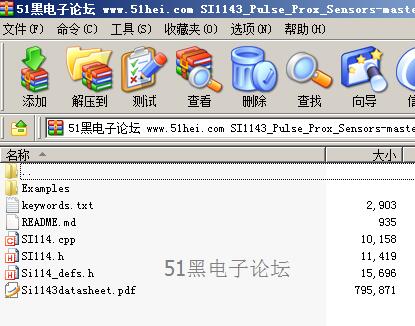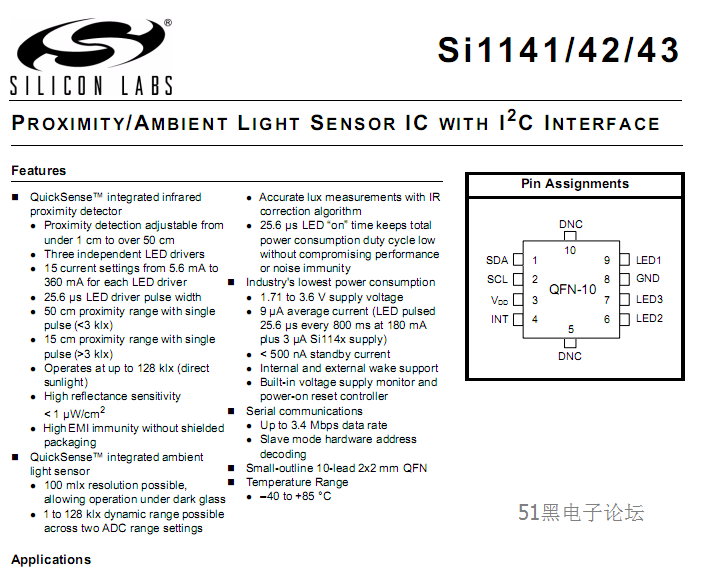最近使用arduino玩了一下这个检测心率血氧的模块
SI1143_Pulse_Prox_Sensors-master


单片机源程序如下:
- // SI114.h
- // Code for the Modern Device Pulse Sensor
- // Based on the SI1143 chip
- // Also includes subset of JeeLabs Ports library - thanks JCW!
- // paul@moderndevice.com 6-27-2012
- #include "SI114.h"
- #include <avr/sleep.h>
- #include <util/atomic.h>
- // flag bits sent to the receiver
- #define MODE_CHANGE 0x80 // a pin mode was changed
- #define DIG_CHANGE 0x40 // a digital output was changed
- #define PWM_CHANGE 0x30 // an analog (pwm) value was changed on port 2..3
- #define ANA_MASK 0x0F // an analog read was requested on port 1..4
- byte PulsePlug::readParam (byte addr) {
- // read from parameter ram
- send();
- write(PulsePlug::COMMAND);
- write(0x80 | addr); // PARAM_QUERY
- stop();
- delay(10);
- return getReg(PulsePlug::PARAM_RD);
- }
- byte PulsePlug::getReg (byte reg) {
- // get a register
- send();
- write(reg);
- receive();
- byte result = read(1);
- stop();
- delay(10);
- return result;
- }
- void PulsePlug::setReg (byte reg, byte val) {
- // set a register
- send();
- write(reg);
- write(val);
- stop();
- delay(10);
- }
- void PulsePlug::initPulsePlug(){
- PulsePlug::setReg(PulsePlug::HW_KEY, 0x17);
- // pulsePlug.setReg(PulsePlug::COMMAND, PulsePlug::RESET_Cmd);
-
- Serial.print("PART: ");
- Serial.print(PulsePlug::getReg(PulsePlug::PART_ID));
- Serial.print(" REV: ");
- Serial.print(PulsePlug::getReg(PulsePlug::REV_ID));
- Serial.print(" SEQ: ");
- Serial.println(PulsePlug::getReg(PulsePlug::SEQ_ID));
-
- PulsePlug::setReg(PulsePlug::INT_CFG, 0x03); // turn on interrupts
- PulsePlug::setReg(PulsePlug::IRQ_ENABLE, 0x10); // turn on interrupt on PS3
- PulsePlug::setReg(PulsePlug::IRQ_MODE2, 0x01); // interrupt on ps3 measurement
- PulsePlug::setReg(PulsePlug::MEAS_RATE, 0x84); // see datasheet
- PulsePlug::setReg(PulsePlug::ALS_RATE, 0x08); // see datasheet
- PulsePlug::setReg(PulsePlug::PS_RATE, 0x08); // see datasheet
- PulsePlug::setReg(PulsePlug::PS_LED21, 0x66 ); // LED current for LEDs 1 (red) & 2 (IR1)
- PulsePlug::setReg(PulsePlug::PS_LED3, 0x06); // LED current for LED 3 (IR2)
-
- Serial.print( "PS_LED21 = ");
- Serial.println(PulsePlug::getReg(PulsePlug::PS_LED21), BIN);
- Serial.print("CHLIST = ");
- Serial.println(PulsePlug::readParam(0x01), BIN);
-
- PulsePlug::writeParam(PulsePlug::PARAM_CH_LIST, 0x77); // all measurements on
-
- // increasing PARAM_PS_ADC_GAIN will increase the LED on time and ADC window
- // you will see increase in brightness of visible LED's, ADC output, & noise
- // datasheet warns not to go beyond 4 because chip or LEDs may be damaged
- PulsePlug::writeParam(PulsePlug::PARAM_PS_ADC_GAIN, 0x00);
-
- PulsePlug::writeParam(PulsePlug::PARAM_PSLED12_SELECT, 0x21); // select LEDs on for readings see datasheet
- PulsePlug::writeParam(PulsePlug::PARAM_PSLED3_SELECT, 0x04); // 3 only
- PulsePlug::writeParam(PulsePlug::PARAM_PS1_ADCMUX, 0x03); // PS1 photodiode select
- PulsePlug::writeParam(PulsePlug::PARAM_PS2_ADCMUX, 0x03); // PS2 photodiode select
- PulsePlug::writeParam(PulsePlug::PARAM_PS3_ADCMUX, 0x03); // PS3 photodiode select
-
- PulsePlug::writeParam(PulsePlug::PARAM_PS_ADC_COUNTER, B01110000); // B01110000 is default
- PulsePlug::setReg(PulsePlug::COMMAND, PulsePlug::PSALS_AUTO_Cmd); // starts an autonomous read loop
-
- }
- void PulsePlug::setLEDcurrents(byte LED1, byte LED2, byte LED3){
- /* VLEDn = 1 V, PS_LEDn = 0001 5.6
- VLEDn = 1 V, PS_LEDn = 0010 11.2
- VLEDn = 1 V, PS_LEDn = 0011 22.4
- VLEDn = 1 V, PS_LEDn = 0100 45
- VLEDn = 1 V, PS_LEDn = 0101 67
- VLEDn = 1 V, PS_LEDn = 0110 90
- VLEDn = 1 V, PS_LEDn = 0111 112
- VLEDn = 1 V, PS_LEDn = 1000 135
- VLEDn = 1 V, PS_LEDn = 1001 157
- VLEDn = 1 V, PS_LEDn = 1010 180
- VLEDn = 1 V, PS_LEDn = 1011 202
- VLEDn = 1 V, PS_LEDn = 1100 224
- VLEDn = 1 V, PS_LEDn = 1101 269
- VLEDn = 1 V, PS_LEDn = 1110 314
- VLEDn = 1 V, PS_LEDn = 1111 359 */
- LED1 = constrain(LED1, 0, 15);
- LED2 = constrain(LED2, 0, 15);
- LED3 = constrain(LED3, 0, 15);
- PulsePlug::setReg(PulsePlug::PS_LED21, (LED2 << 4) | LED1 );
- PulsePlug::setReg(PulsePlug::PS_LED3, LED3);
- }
- void PulsePlug::setLEDdrive(byte LED1pulse, byte LED2pulse, byte LED3pulse){
- // this sets which LEDs are active on which pulses
- // any or none of the LEDs may be active on each PulsePlug
- //000: NO LED DRIVE
- //xx1: LED1 Drive Enabled
- //x1x: LED2 Drive Enabled (Si1142 and Si1143 only. Clear for Si1141)
- //1xx: LED3 Drive Enabled (Si1143 only. Clear for Si1141 and Si1142)
- // example setLEDdrive(1, 2, 5); sets LED1 on pulse 1, LED2 on pulse 2, LED3, LED1 on pulse 3
-
- PulsePlug::writeParam(PulsePlug::PARAM_PSLED12_SELECT, (LED1pulse << 4) | LED2pulse ); // select LEDs on for readings see datasheet
- PulsePlug::writeParam(PulsePlug::PARAM_PSLED3_SELECT, LED3pulse);
- }
- void PulsePlug::fetchData () {
- // read out all result registers as lsb-msb pairs of bytes
- send();
- write(PulsePlug::RESPONSE);
- receive();
- byte* p = (byte*) &resp;
- for (byte i = 0; i < 16; ++i)
- p[i] = read(0);
- read(1); // just to end cleanly
- stop();
- }
- void PulsePlug::fetchLedData() {
- // read only the LED registers as lsb-msb pairs of bytes
- send();
- write(PulsePlug::PS1_DATA0);
- receive();
- byte* q = (byte*) &ps1;
- for (byte i = 0; i < 6; ++i)
- q[i] = read(0);
- read(1); // just to end cleanly
- stop();
- }
- void PulsePlug::writeParam (byte addr, byte val) {
- // write to parameter ram
- send();
- write(PulsePlug::PARAM_WR);
- write(val);
- // auto-increments into PulsePlug::COMMAND
- write(0xA0 | addr); // PARAM_SET
- stop();
- delay(10);
- }
- uint16_t Port::shiftRead(uint8_t bitOrder, uint8_t count) const {
- uint16_t value = 0, mask = bit(LSBFIRST ? 0 : count - 1);
- for (uint8_t i = 0; i < count; ++i) {
- digiWrite2(1);
- delayMicroseconds(5);
- if (digiRead())
- value |= mask;
- if (bitOrder == LSBFIRST)
- mask <<= 1;
- else
- mask >>= 1;
- digiWrite2(0);
- delayMicroseconds(5);
- }
- return value;
- }
- void Port::shiftWrite(uint8_t bitOrder, uint16_t value, uint8_t count) const {
- uint16_t mask = bit(LSBFIRST ? 0 : count - 1);
- for (uint8_t i = 0; i < count; ++i) {
- digiWrite((value & mask) != 0);
- if (bitOrder == LSBFIRST)
- mask <<= 1;
- else
- mask >>= 1;
- digiWrite2(1);
- digiWrite2(0);
- }
- }
- PortI2C::PortI2C (uint8_t num, uint8_t rate)
- : Port (num), uswait (rate)
- {
- sdaOut(1);
- mode2(OUTPUT);
- sclHi();
- }
- uint8_t PortI2C::start(uint8_t addr) const {
- sclLo();
- sclHi();
- sdaOut(0);
- return write(addr);
- }
- void PortI2C::stop() const {
- sdaOut(0);
- sclHi();
- sdaOut(1);
- }
- uint8_t PortI2C::write(uint8_t data) const {
- sclLo();
- for (uint8_t mask = 0x80; mask != 0; mask >>= 1) {
- sdaOut(data & mask);
- sclHi();
- sclLo();
- }
- sdaOut(1);
- sclHi();
- uint8_t ack = ! sdaIn();
- sclLo();
- return ack;
- }
- uint8_t PortI2C::read(uint8_t last) const {
- uint8_t data = 0;
- for (uint8_t mask = 0x80; mask != 0; mask >>= 1) {
- sclHi();
- if (sdaIn())
- data |= mask;
- sclLo();
- }
- sdaOut(last);
- sclHi();
- sclLo();
- if (last)
- stop();
- sdaOut(1);
- return data;
- }
- bool DeviceI2C::isPresent () const {
- byte ok = send();
- stop();
- return ok;
- }
- byte MilliTimer::poll(word ms) {
- byte ready = 0;
- if (armed) {
- word remain = next - millis();
- // since remain is unsigned, it will overflow to large values when
- // the timeout is reached, so this test works as long as poll() is
- // called no later than 5535 millisecs after the timer has expired
- if (remain <= 60000)
- return 0;
- // return a value between 1 and 255, being msecs+1 past expiration
- // note: the actual return value is only reliable if poll() is
- // called no later than 255 millisecs after the timer has expired
- ready = -remain;
- }
- set(ms);
- return ready;
- }
- word MilliTimer::remaining() const {
- word remain = armed ? next - millis() : 0;
- return remain <= 60000 ? remain : 0;
- }
- void MilliTimer::set(word ms) {
- armed = ms != 0;
- if (armed)
- next = millis() + ms - 1;
- }
- Scheduler::Scheduler (byte size) : maxTasks (size), remaining (~0) {
- byte bytes = size * sizeof *tasks;
- tasks = (word*) malloc(bytes);
- memset(tasks, 0xFF, bytes);
- }
- Scheduler::Scheduler (word* buf, byte size) : tasks (buf), maxTasks (size), remaining(~0) {
- byte bytes = size * sizeof *tasks;
- memset(tasks, 0xFF, bytes);
- }
- char Scheduler::poll() {
- // all times in the tasks array are relative to the "remaining" value
- // i.e. only remaining counts down while waiting for the next timeout
- if (remaining == 0) {
- word lowest = ~0;
- for (byte i = 0; i < maxTasks; ++i) {
- if (tasks[i] == 0) {
- tasks[i] = ~0;
- return i;
- }
- if (tasks[i] < lowest)
- lowest = tasks[i];
- }
- if (lowest != ~0) {
- for (byte i = 0; i < maxTasks; ++i) {
- if(tasks[i] != ~0) {
- tasks[i] -= lowest;
- }
- }
- }
- remaining = lowest;
- } else if (remaining == ~0) //remaining == ~0 means nothing running
- return -2;
- else if (ms100.poll(100))
- --remaining;
- return -1;
- }
- void Scheduler::timer(byte task, word tenths) {
- // if new timer will go off sooner than the rest, then adjust all entries
- if (tenths < remaining) {
- word diff = remaining - tenths;
- for (byte i = 0; i < maxTasks; ++i)
- if (tasks[i] != ~0)
- tasks[i] += diff;
- remaining = tenths;
- }
- tasks[task] = tenths - remaining;
- }
- void Scheduler::cancel(byte task) {
- tasks[task] = ~0;
- }
所有资料51hei提供下载:
 SI1143_Pulse_Prox_Sensors-master.rar
(759.03 KB, 下载次数: 34)
SI1143_Pulse_Prox_Sensors-master.rar
(759.03 KB, 下载次数: 34)
|